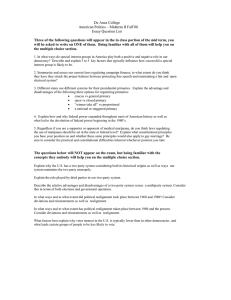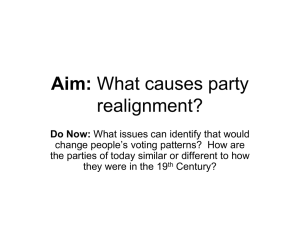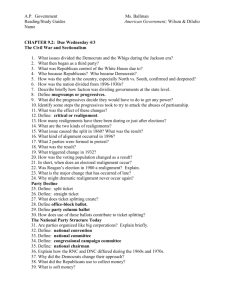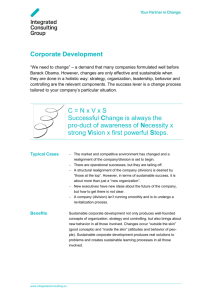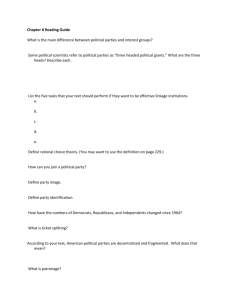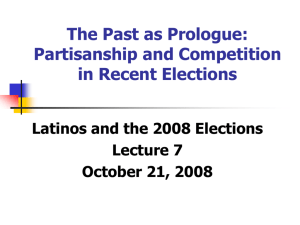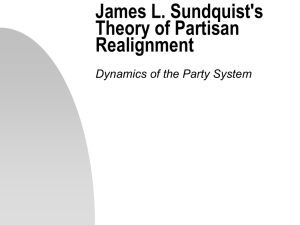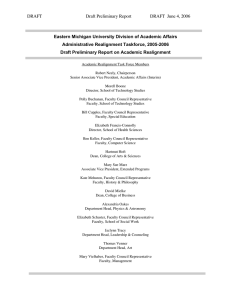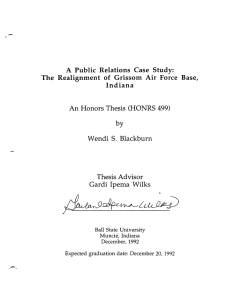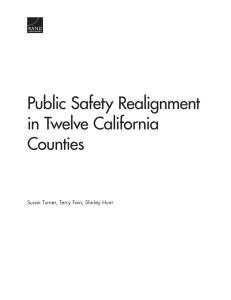REPORT OF THE STRATEGIC REALIGNMENT TASK FORCE May 2, 2014
advertisement
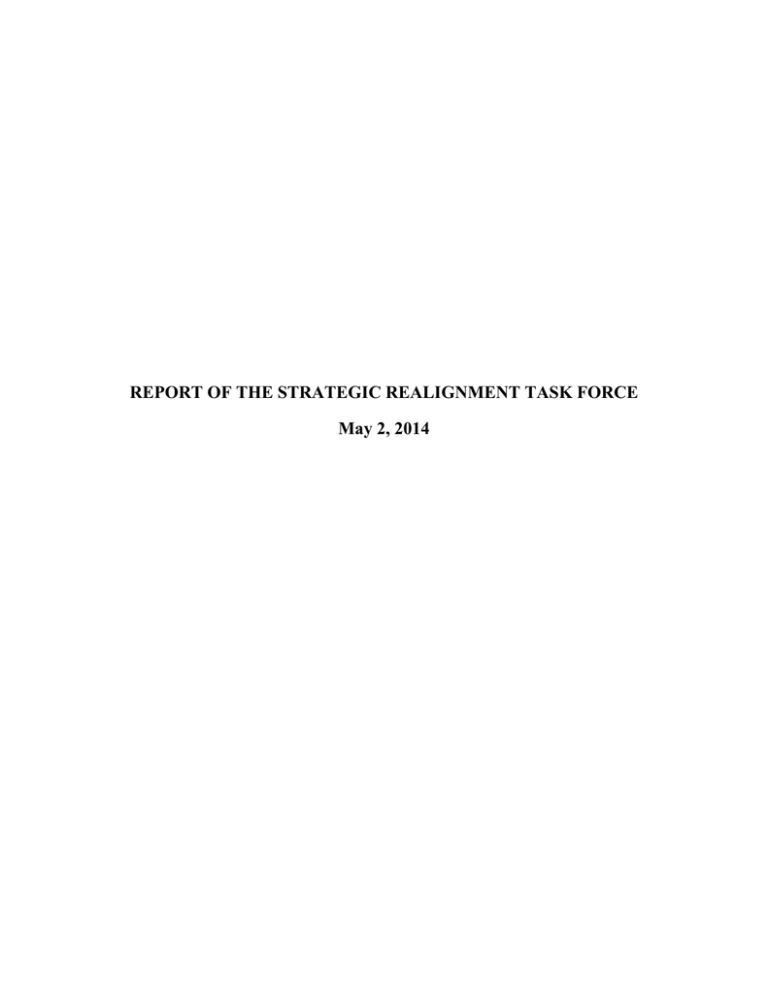
REPORT OF THE STRATEGIC REALIGNMENT TASK FORCE May 2, 2014 Strategic Realignment at Winston-Salem State University Changing enrollment patterns, declining revenue streams and public funding, increasing competition, and the necessity for achieving long-term operational efficiencies are but some of the critical issues facing colleges and universities. On February 10 and 11, 2014, Chancellor Donald J. Reaves and Provost Brenda A. Allen announced a strategic realignment of the School of Business and Economics, the School of Education and Human Performance and the College of Arts and Sciences. The aim was to position Winston-Salem State University to meet these challenges while enabling the university to advance its unique educational mission. The strategic realignment is part of the ongoing process of reducing administrative costs while reinvesting in the core academic priorities of the university. Indeed, the university’s strategic plan, “Achieving Academic Distinction: The Plan for Student Success,” states, “[T]he Plan requires that we develop an administrative infrastructure capable of supporting our goals. . . . [T]he Plan acknowledges that we cannot reach our goals unless we align our resources with the highest academic priorities.” The new College of Arts, Sciences, Business and Education will enable the institution to reinvest in existing academic programs and bring greater integration of liberal arts and professional programs in creating a distinctive learning environment for all students. Overview of the Task Force As part of the strategic realignment, the Chancellor and Provost asked the Dean of the College of Arts and Sciences, and the Interim Deans of the School of Business and Economics and School of Education and Human Performance to convene a task force of faculty, staff, students, and alumni to offer critical advice, feedback, and guidance on the issue. The Task Force was asked to submit its recommendations to the Chancellor and Provost. On February 18, 2014, invitations were sent to select members of the university community to serve on the task force. The appointed task force members are Bryant Bell '14, President, SGA; Moula Cherikh, Professor and Chair, Department of Management and Marketing; Beth DayHairston '84, Associate Professor, Department of Education; Glen A. Holmes, Professor, Department of Education; Joyce Jenkins, Business Officer, School of Business and Economics; Zagros Madjd-Sadjadi, Professor, Department of Economics and Finance; Shirley Manigault, Professor, Department of English; Candrice Nolan '08, MBA Student, School of Business, Wake Forest University; Notis Pagiavlas, Professor, Department of Management and Marketing; Christina Placilla, Associate Professor, Department of Music and Chair, WSSU Faculty Senate; Peggy Valentine, Dean, School of Health Sciences; and Lynn Zubov, Associate Professor, Department of Education. The task force was co-chaired by Deans Suresh Gopalan, Denise Pearson, and Corey D. B. Walker and staffed by Theresa Willie. Task Force Work Plan The Task Force on Strategic Realignment was charged to 1) identify and prioritize the unique needs and issues that must be addressed as a result of the realignment; 2) identify particular interdisciplinary teaching and research clusters that may enhance student success and the 2 academic distinctiveness of the university; and 3) recommend a broad institutional and public communications strategy to highlight opportunities created by this realignment. The Task Force convened its first meeting on March 6, 2014 and met subsequently on March 20, March 27, April 3, April 17, and May 1, 2014. The Task Force reviewed a number of institutional data documents and reports, documents describing restricting efforts at other constituent UNC institutions, reports and papers on trends in higher education, reports on the future of Historically Black Colleges and Universities (HBCUs), news reports on budgetary challenges facing UNC system institutions, and other relevant items. Important principles that guided the work of the Task Force are as follows: • • • • • Maintaining a clear and consistent focus on how to offer students at Winston-Salem State University a distinctive and world-class education; Focusing on aligning academic programs with the institutional mission and vision in a clear and consistent manner; Broadening and deepening collaboration between academic programs, research and teaching centers, and other academic initiatives; Enhancing curriculum design, development and delivery consistent with core academic priorities; and Highlighting ways in which realignment and reaffirmation of accreditation for academic programs, particularly in business and education, are mutually reinforcing. Task Force Recommendations The Task Force responded to its charge by formulating a series of recommendations consistent with the five goals of “Achieving Academic Distinction: The Plan for Student Success.” The recommendations build on the strengths of the institution while providing opportunities to enhance its distinctiveness and value. The following are the recommendations of the Task Force. Academic Excellence 1. Explore possibilities for developing joint graduate programs that leverage the comparative strengths of graduate programs in the College and in the School of Health Sciences 2. Continue efforts on faculty renewal with an emphasis on key strategic and transformative hires that cross disciplinary fields 3. Explore new possibilities for academic collaboration around the themes and clusters of entrepreneurship, innovation, internationalization, and social justice 4. Develop new models of intellectual leadership in centers and initiatives supportive of nurturing distinctive teaching and research cultures Student Success 1. Continue efforts on curricular renewal with an emphasis on interdisciplinary collaboration within and between the liberal arts and professional programs 2. Explore possibilities for new academic terms to enhance student success 3 3. Explore opportunities for the creation of seamless undergraduate/graduate programs including 4+1 opportunities for the liberal arts and the Master of Arts in Teaching, Master of Science in Computer Science, and Master of Healthcare Administration 4. Leverage synergies between academic programs, centers and initiatives, especially the Center for Design Innovation Community Engagement 1. Conduct an analysis of existing centers and initiatives to assess their strengths and challenges 2. Continually engage alumni and the community in conversations about the university 3. Develop resources to enable faculty to create and sustain engaged scholarship that responds to the needs of the region and the state Efficiency, Effectiveness and Resources 1. Develop a comprehensive approach to professional staff development to create opportunities for growth and enhancement 2. Emphasize ongoing strategic planning for all academic programs, centers and initiatives consistent with the mission of the university 3. Leverage the physical space of the campus and new media technologies to encourage interdisciplinary learning and collaboration 4. Continue to support innovative curriculum development, delivery, assessment, and quality University Culture and Pride 1. Develop a broad local and regional marketing campaign, including social media outlets, to highlight the realignment and inform the public about the evolution of the university 2. Create institutional forums for critical conversations regarding academic culture and climate 3. Engage in a year-long faculty conversation about the role and nature of intellectual life and institutional identity Conclusion The recommendations of the Task Force on Strategic Realignment have been developed to enable our institution to meet the challenges of the current educational environment and to realize our aspirations as a leading higher educational institution. In continuing the audacious work begun in 1892, we trust the entire university community will respond collaboratively and creatively in ensuring the success of future generations of students who will come to WinstonSalem State University seeking to live out our motto “Enter to learn, Depart to serve.” 4
